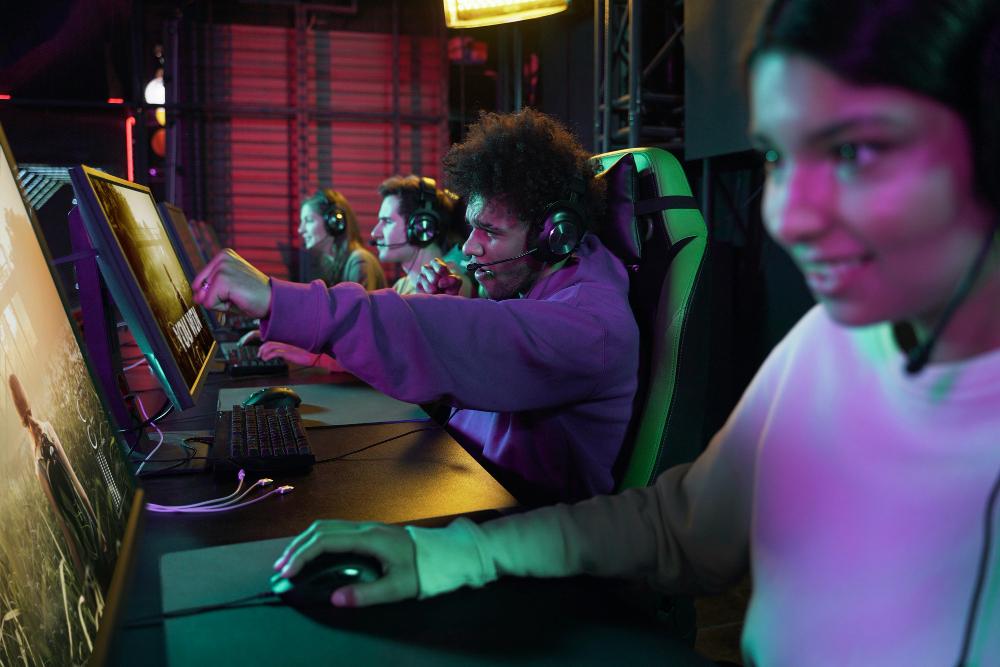Gaming Training Tech: Revolutionizing How Gamers Level Up

In the ever-evolving world of video games, competition has become fiercer than ever. With the rise of esports, streaming platforms, and online multiplayer experiences, casual gaming has evolved into a serious discipline. Just as athletes rely on training gear, drills, and analytics to improve, gamers too are turning to gaming training tech—an emerging field that leverages technology to enhance reflexes, decision-making, teamwork, and strategic thinking. This article explores the latest in gaming training technologies, how they work, who uses them, and how they are reshaping the gaming landscape.
The Need for Gaming Training Technology
Gaming is no longer just a hobby; it is a multi-billion-dollar industry that encompasses professional esports, competitive leagues, content creation, and international tournaments. Success in gaming today requires more than talent. It demands precision, fast reflexes, adaptability, communication, and deep game knowledge. For professionals and aspiring players, gaming training tech provides the edge needed to compete and win. These technologies offer targeted improvement, performance tracking, and data-driven feedback—things that were once exclusive to physical sports.
Key Categories of Gaming Training Tech
Gaming training tech falls into several categories, each focusing on specific aspects of performance. These include aim trainers, reflex boosters, cognitive training apps, coaching software, and hardware-based feedback systems. Each category contributes to different areas of gameplay, from mechanical skills to mental resilience.
Aim Trainers
Aim trainers are software tools designed to sharpen a player's accuracy, speed, and consistency in shooting games. Popular platforms like Aim Lab, Kovaak’s FPS Aim Trainer, and Aimtastic offer customizable drills to practice flick shots, tracking, target switching, and reaction time. These tools provide analytics such as accuracy percentage, time-to-kill (TTK), and movement efficiency, allowing players to monitor improvement over time. These trainers are especially beneficial for players of FPS games like Valorant, Counter-Strike 2, and Call of Duty.
Reflex and Reaction Time Tools
Reflex training tech enhances a player's ability to respond quickly to stimuli. Tools like Human Benchmark, Reaction Time Test, and browser-based games help develop faster response speeds. These are often used to complement aim training but are also valuable in genres like fighting games, racing games, and MOBAs where split-second decisions make all the difference. Reaction time can be improved through repetition, timing drills, and hand-eye coordination exercises.
Cognitive Gaming Apps
Cognitive training platforms such as Lumosity, NeuroTracker, and BrainHQ have begun to cross over into gaming, offering exercises that improve focus, memory, decision-making, and multitasking. These skills are essential in strategy games like StarCraft II, battle royale titles like Fortnite, and complex RPGs where players must juggle multiple objectives. By incorporating psychological principles, these apps help gamers train their minds like athletes train their bodies.
Coaching and Feedback Software
Platforms like Gamer Sensei, ProGuides, and Metafy provide professional coaching sessions, AI-powered feedback, and structured learning paths. These services pair players with coaches from top games like League of Legends, Dota 2, and Apex Legends, offering one-on-one sessions or group classes. Some tools even analyze in-game footage and offer feedback on positioning, map awareness, and decision-making. By treating gameplay like a skillset to be refined, these services elevate amateurs into competitive contenders.
Hardware for Training and Optimization
Gaming mice with customizable DPI settings, high-refresh-rate monitors, mechanical keyboards, and ergonomic chairs play a vital role in training. Devices like the Bcon foot controller or eye-tracking hardware from Tobii enable new forms of input analysis and gameplay understanding. Some players use tools like reaction light panels or even VR to simulate combat and improve peripheral awareness. Specialized hardware is not just for comfort—it plays a functional role in developing muscle memory and accuracy.
Biometric Feedback and Wearables
Gaming wearables are an emerging part of the training tech landscape. Devices such as smartwatches, heart rate monitors, and EEG headbands help track stress, focus, and fatigue levels. By analyzing these metrics, gamers can adjust their schedules, take breaks at optimal times, and better manage performance anxiety. Some pro teams are experimenting with biometric data to improve training regimens and predict burnout. The integration of health and performance tracking creates a holistic approach to training.
Virtual Reality (VR) and Augmented Reality (AR) Training
VR is not just for immersive gameplay—it is a powerful training tool. VR platforms like Hot Squat VR or Pistol Whip can train agility and aim in a physical 3D environment, helping to develop better spatial awareness. Meanwhile, AR glasses and heads-up displays are being explored for real-time stat tracking and information overlays. These technologies are turning training into a physical and interactive experience, blurring the line between gaming and sports training.
Training for Esports Teams
Professional esports teams use a blend of technologies to train players. This includes aim and reaction trainers, cognitive assessments, performance analytics, mental health tools, and team-based strategy simulations. Team houses are equipped with state-of-the-art gear, diet plans, physical trainers, and psychologists. In fact, top-tier teams treat their players like professional athletes, with scheduled practice, performance reviews, and skill-specific coaching. Gaming training tech enables consistent development and long-term planning.
Streaming and Audience Learning
Streaming platforms like Twitch and YouTube are not just entertainment hubs—they are educational tools. Gamers often train by watching professionals break down strategies, analyze mechanics, or conduct training routines. Tools like OBS overlays, real-time stat tracking, and interactive Q&A sessions allow viewers to learn passively or engage directly. Some streamers use training tools live on stream, offering valuable insight into practice methods.
Gamified Training and Progression
One of the most effective aspects of gaming training tech is gamification. Progress bars, levels, challenges, and rewards turn tedious practice into fun, engaging sessions. Whether it's completing a perfect accuracy drill or improving your reaction speed by milliseconds, gamification motivates players to keep improving. This element makes training sustainable and enjoyable, which is crucial for long-term growth.
The Role of AI and Machine Learning
AI is now being integrated into many training tools. For instance, some platforms offer AI-generated bots that adapt to a player's skill level, providing a personalized challenge that scales over time. AI can also analyze gameplay to detect habits, highlight mistakes, and recommend corrections. In competitive titles, AI-driven analysis has become a game-changer, allowing players to review heat maps, decision trees, and opponent tendencies.
Training for Different Genres
Different game genres require different training focuses. First-person shooters demand accuracy and reflexes, so players benefit from aim and reaction trainers. Strategy games focus on multitasking and decision-making, which can be honed through cognitive apps and coaching. MOBAs require teamwork, map control, and build knowledge, making game-specific coaching and macro-strategy analysis important. By customizing training to the genre, players can achieve faster and more relevant progress.
Mobile Gaming and Training Tools
With mobile gaming gaining ground globally, training tools are also adapting. Apps like Touchscreen Aim Trainer or FPS Trainer Mobile offer on-the-go performance enhancement. Mobile players can now refine their aim, finger speed, and game sense just like their PC counterparts. This evolution ensures that mobile esports and competitive mobile gaming are taken seriously, with dedicated training support.
Challenges and Concerns
While gaming training tech offers many benefits, there are challenges. Overtraining can lead to burnout, repetitive strain injuries, and mental fatigue. There's also the risk of becoming too reliant on software or data, losing the creativity and intuition that often separate good players from great ones. Additionally, not all tools are accessible to everyone, and some advanced training systems require expensive hardware or subscriptions. Striking a balance between structured training and natural play is essential.
The Future of Gaming Training Tech
The future of gaming training tech looks promising. Advancements in AI, brain-computer interfaces, biometric sensors, and AR are opening new possibilities. Gamers may soon train using neurofeedback headsets that respond to focus levels or engage in virtual drills that mirror real-life combat training. Institutions like esports academies and digital sports labs are becoming more common, indicating a shift towards formalized, high-tech training environments. As gaming becomes more competitive and more professional, the demand for efficient, scientific training tools will only grow.
Conclusion
Gaming training tech is no longer an optional luxury—it is a vital tool for anyone aiming to improve in the competitive gaming space. From aim trainers and reaction tools to coaching platforms and wearable tech, the variety and sophistication of these tools are accelerating player development. As technology continues to evolve, gamers at all levels will have access to smarter, faster, and more personalized ways to level up their skills. Whether you're an aspiring esports pro or a casual gamer looking to climb the ranks, gaming training tech can help unlock your full potential in the digital arena.
- Pet
- Discover the Majestic World of Horses: Care & Training
- Technology
- Business
- Health
- Art
- Causes
- Crafts
- Dance
- Drinks
- Film
- Fitness
- Food
- Spellen
- Gardening
- Health
- Home
- Literature
- Music
- Networking
- Other
- Party
- Religion
- Shopping
- Sports
- Theater
- Wellness



